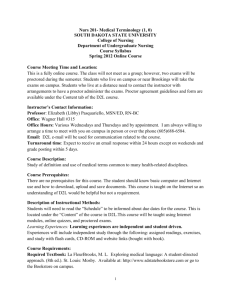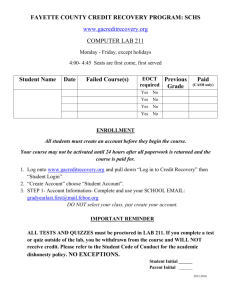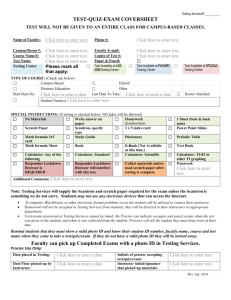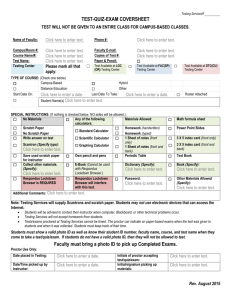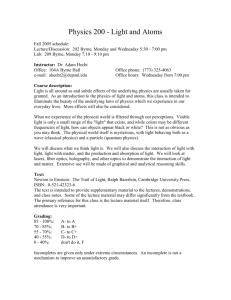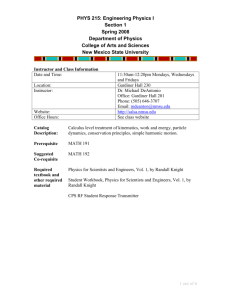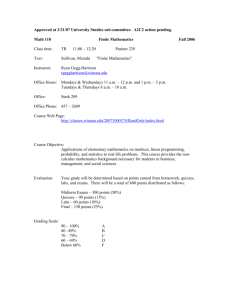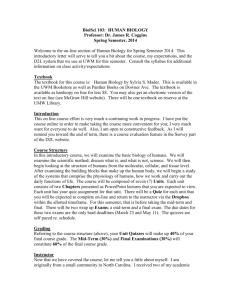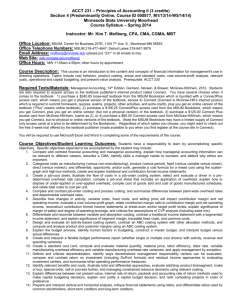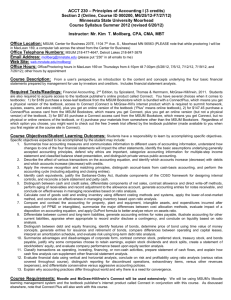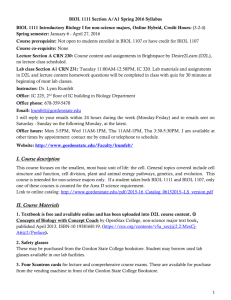SOUTH DAKOTA STATE UNIVERSITY College of Nursing
advertisement
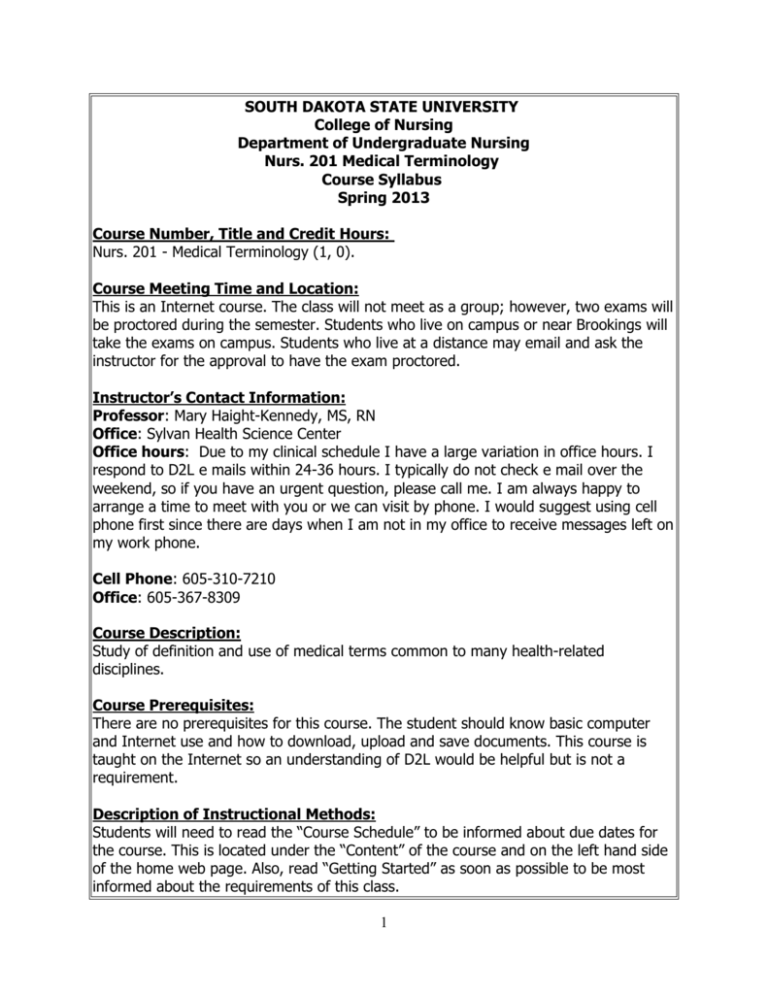
SOUTH DAKOTA STATE UNIVERSITY College of Nursing Department of Undergraduate Nursing Nurs. 201 Medical Terminology Course Syllabus Spring 2013 Course Number, Title and Credit Hours: Nurs. 201 - Medical Terminology (1, 0). Course Meeting Time and Location: This is an Internet course. The class will not meet as a group; however, two exams will be proctored during the semester. Students who live on campus or near Brookings will take the exams on campus. Students who live at a distance may email and ask the instructor for the approval to have the exam proctored. Instructor’s Contact Information: Professor: Mary Haight-Kennedy, MS, RN Office: Sylvan Health Science Center Office hours: Due to my clinical schedule I have a large variation in office hours. I respond to D2L e mails within 24-36 hours. I typically do not check e mail over the weekend, so if you have an urgent question, please call me. I am always happy to arrange a time to meet with you or we can visit by phone. I would suggest using cell phone first since there are days when I am not in my office to receive messages left on my work phone. Cell Phone: 605-310-7210 Office: 605-367-8309 Course Description: Study of definition and use of medical terms common to many health-related disciplines. Course Prerequisites: There are no prerequisites for this course. The student should know basic computer and Internet use and how to download, upload and save documents. This course is taught on the Internet so an understanding of D2L would be helpful but is not a requirement. Description of Instructional Methods: Students will need to read the “Course Schedule” to be informed about due dates for the course. This is located under the “Content” of the course and on the left hand side of the home web page. Also, read “Getting Started” as soon as possible to be most informed about the requirements of this class. 1 Instructional Methods: This course will be taught using Internet modules, 9 open book online quizzes, 2 proctored exams, and flash cards. Learning Experiences: Learning experiences in this course will include the following: readings, exercises, and independent study. Also, we will use “Discussion” to introduce ourselves at the beginning of the course. Technical Support: Students may call Helpdesk 605-688-6776 or reach them by e-mail at SDSU.supportdesk@sdstate.edu. http://www3.sdstate.edu/TechnologySupport/InformationTechnologyServices/ Distance Education Support can be reached at: http://distance.sdstate.edu/ Course Requirements: Required Textbook: La FleurBrooks, M. L. (2009). Exploring medical language: A student-directed approach. (8th ed.). St. Louis: Mosby. Available at: http://www.sdstatebookstore.com or go to the Bookstore on campus. Class Attendance Policy: This is an Internet course. Completion of the 9 online open book quizzes is considered attendance for this class. Students will be expected to study independently and to read the schedule and the assigned module for each week and to complete their homework and memorization before taking the quiz for that module. No homework assignments are turned in. The assignments for each module are for your benefit. The class will not meet as a group for instruction. SDSU Academic Dishonesty Policy: South Dakota State University has taken a strong and clear stand regarding Academic Dishonesty. The consequence of Academic Dishonesty ranges from Disciplinary Probation to Expulsion. The full policies are found in Chapter 1 of the Student Code (01:10:23:01 - 1:10:23:04) within the Student Policy Manual. A student charged with Academic Dishonesty who wishes to appeal that charge may follow the appeals Procedure outlines in Chapter 2 of the Student Policy Manual (Academic Appeals and Classroom Standards) or contact the Vice President for Academic Affairs Office, AD 230, 688-4173. Any evidence of cheating or dishonesty will result in a zero for the test and may also result in an "F" for the course, according to the discretion of the instructor. Students are expected to complete all of their own home work and their own quizzes by them self. Assignments that are copied from others or downloaded from others would be considered cheating. 2 Make-Up Policy: Students, who are ill, have accidents, family emergencies, or deaths should call the instructor immediately and ask for an extension on their work. If a student does not call in advance of the due date for the assignment or exam then the student will receive a zero for that assignment or exam. The instructor may request for documentation to substantiate the absence. If the instructor excuses the absence then a new due date will be set for the assignment and the work must be completed by that time to receive credit. Student Learning Outcomes: 1. Define medical terms by analyzing their component parts. 2. Recognize common medical abbreviations. 3. Spell and use medical words correctly in speech and writing. 4. Define anatomical terms for all the body systems. 5. Analyze diagnostic terms for all body systems. 6. Define surgical terms for all body systems. 7. Define medical terms for given definitions. 8. Build medical terms for given definitions. 9. Define word parts. 10. Define key terms that describe the body directions, anatomical planes, and anatomical abdominal regions. Evaluation of Student Learning: Grades will be posted within 24 to 48 hours on D2L after the quiz is closed. Quizzes: There will be 9 quizzes. All quizzes will be taken in D2L (use Quiz tab at the top of the page in the yellow bar) on your own. Lockdown browser is NOT needed for the quizzes. The quizzes will be composed of multiple choice and short answer questions regarding any information in the assigned chapters. Each quiz will be composed of 13 points. Exams: There are two exams: the mid-term and comprehensive final exam. Both exams will be taken on the Internet within a Lockdown Browser with a proctor required. Each exam will cover the terms listed at the end of the assigned chapters. The mid-term and final exams are closed book and proctored. The mid-term grade will be based on quizzes 1-5 and mid-term test. The final will be comprehensive. Students who live on campus or near Brookings will take the Mid-Term and the Comprehensive Final Exam on campus with myself acting as the proctor. Students who live at a distance may email and ask for the approval to have the exam proctored elsewhere. Students who desire this option must contact the instructor early (within 4 weeks of the exam) to line up a proctor. See the “Content” section for the “Proctor Guidelines” and the “Proctor Agreement Form”. Once the approval for the proctor has been given, the student should contact the proctor and send them the “Proctor Agreement” form. 3 The “Proctor Agreement” form must be returned by email to the instructor by 4 weeks prior to the Mid-Term Exam and the Comprehensive Final Exam. If the form is not returned by this time then the instructor may require the student to come to campus to take the exam. Each quiz is worth approximately 13 points……………………………........117 points Mid-term exam................................................................................50 points Final exam .....................................................................................63 points Total points...................................................................................230 points Performance Standards: The South Dakota State University grading scale will be used as the performance standard to assign the final grade in this class: A = 90% - 100% B = 80% - 89% C = 70% - 79% D = 60% - 69% F = Below 60% ADA Statement: Any student who feels s/he may need an accommodation based on the impact of a disability should contact Nancy Hartenoff-Crooks, Coordinator of Disability Services (605-688-4504 or Fax, 605-688-4987) to privately discuss your specific needs. The Office of Disability Services is located in room 065, the Student Union. Freedom in Learning Statement: Freedom in Learning. Students are responsible for learning the content of any course of study in which they are enrolled. Under Board of Regents and University policy, student academic performance shall be evaluated solely on an academic basis and students should be free to take reasoned exception to the data or views offered in any courses of study. Students who believe that an academic evaluation is unrelated to academic standards but is related instead to judgment of their personal opinion or conduct should first contact the instructor of the course. If the student remains unsatisfied, the student may contact the department head and/or dean of the college which offers the class to initiate a review of the evaluation. Last Update: January 2013, Maintained by Mary Haight-Kennedy, MS, RN 4
